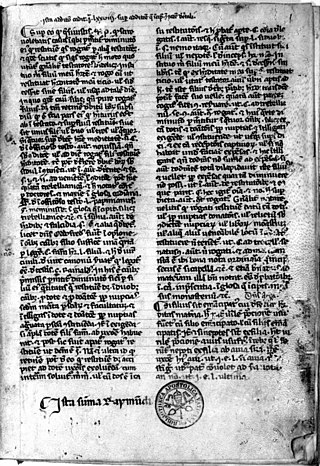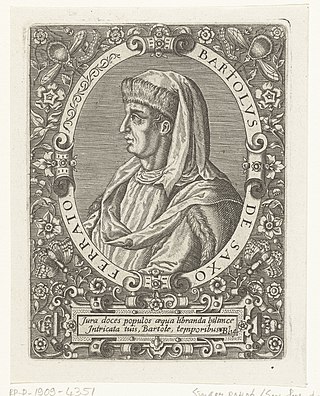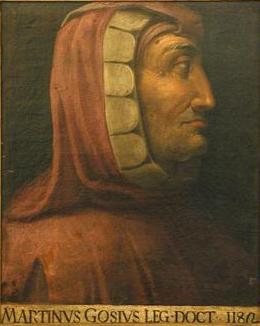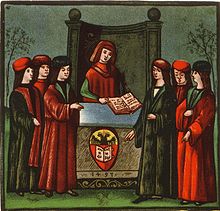
The Corpus JurisCivilis is the modern name for a collection of fundamental works in jurisprudence, enacted from 529 to 534 by order of Byzantine Emperor Justinian I. It is also sometimes referred to metonymically after one of its parts, the Code of Justinian.

Richard Zouch was an English judge and a Member of Parliament from 1621 to 1624. He was elected Member of Parliament for Hythe in 1621 and later became principal of St. Alban Hall, Oxford. During the English Civil War, he was a Royalist and was appointed by Oliver Cromwell to a special commission of oyer and terminer. Zouch wrote extensive legal texts and was among the earliest systematic writers of international law.

Jacobus Balduinus was an Italian jurist.

Baldus de Ubaldis was an Italian jurist, and a leading figure in Medieval Roman Law and the school of Postglossators.

A Juris Doctor, Doctor of Jurisprudence, or Doctor of Law (JD) is a graduate-entry professional degree that primarily prepares individuals to practice law. In the United States, it is the only qualifying law degree, while other jurisdictions, such as Australia, Canada, and Hong Kong, offer both JD degrees and undergraduate qualifying law degrees.

Friedrich Carl von Savigny was a German jurist and historian.

Caspar Rudolph Ritter von Jhering was a German jurist. He is best known for his 1872 book Der Kampf ums Recht, as a legal scholar, and as the founder of a modern sociological and historical school of law. His ideas were important to the subsequent development of the "jurisprudence of interests" in Germany.

Bartolus de Saxoferrato was an Italian law professor and one of the most prominent continental jurists of Medieval Roman Law. He belonged to the school known as the commentators or postglossators. The admiration of later generations of civil lawyers is shown by the adage nemo bonus íurista nisi bartolista — no one is a good lawyer unless he is a Bartolist.
The scholars of the 11th- and 12th-century legal schools in Italy, France and Germany are identified as glossators in a specific sense. They studied Roman law based on the Digesta, the Codex of Justinian, the Authenticum, and his law manual, the Institutiones Iustiniani, compiled together in the Corpus Iuris Civilis. Their work transformed the inherited ancient texts into a living tradition of medieval Roman law.

Accursius was an Italian jurist. He is notable for his organization of the glosses, the medieval comments on Justinian's codification of Roman law, the Corpus Juris Civilis. He was not proficient in the classics, but he was called "the Idol of the Jurisconsults".

Irnerius, sometimes referred to as lucerna juris, was an Italian jurist, and founder of the School of Glossators and thus of the tradition of medieval Roman Law.

Odofredus was an Italian jurist. He was born in Ostia and moved to Bologna, studying law under Jacobus Balduinus and Franciscus Accursius. After working as an advocate in Italy and France, he became a law professor in Bologna in 1228. The commentaries on Roman law attributed to him are valuable as showing the growth of the study of law in Italy, and for their biographical details of the jurists of the 12th and 13th centuries. Odofredus died at Bologna in 1265.

Georg Friedrich Puchta was an important German Legal scholar.

Paulus Castrensis was an Italian jurist of the 14th century.

Martinus Gosia was one of the glossators and a 12th-century Italian jurist, counted among the Four Doctors of Bologna, the others being Bulgarus, Hugo de Porta Ravennate and Jacobus de Boragine.

Bulgarus was a twelfth-century Italian jurist, born in Bologna.
Joannes Bassianus was an Italian jurist of the 12th century.
Brachylogus, is a title applied in the middle of the 16th century to a work containing a systematic exposition of the Roman law. Some writers have assigned to the reign of the emperor Justinian I, and others have treated as an apocryphal work of the 16th century.

The Four Doctors of Bologna were Italian jurists and glossators of the 12th century, based in the University of Bologna: Bulgarus, Martinus Gosia, Jacobus de Boragine and Hugo de Porta Ravennate.
The Institutes is a beginners' textbook on Roman private law written around 161 CE by the classical Roman jurist Gaius. The Institutes are considered to be "by far the most influential elementary-systematic presentation of Roman private law in late antiquity, the Middle Ages and modern times". The content of the textbook was considered to be lost until 1816, when a manuscript of it − probably of the 5th century − was discovered.
















